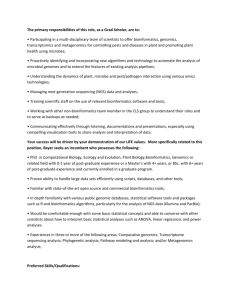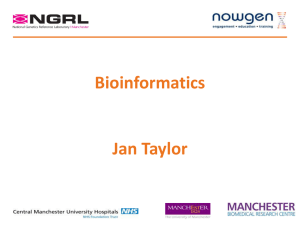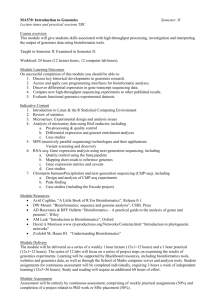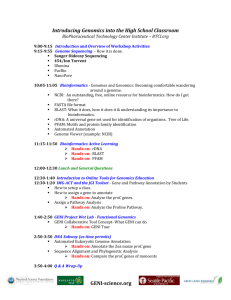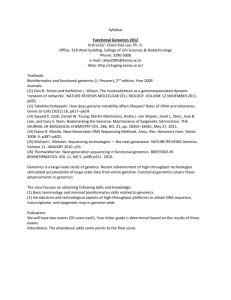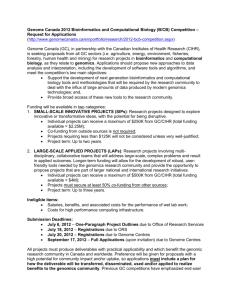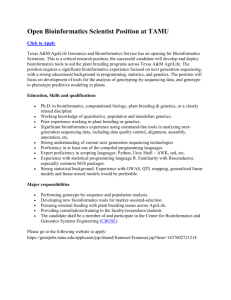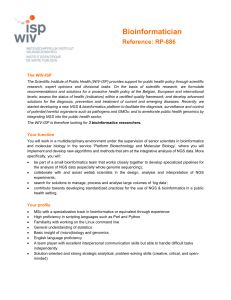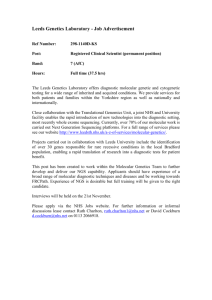Final JD - RB012-14 Bio Research Associate - Workspace
advertisement
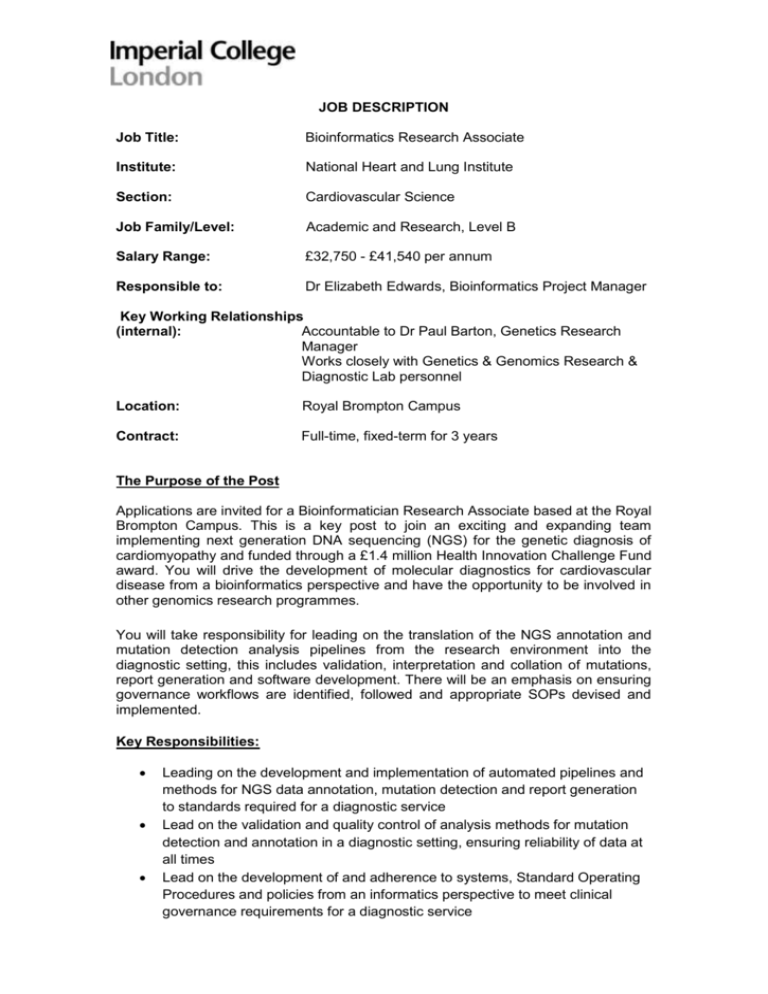
JOB DESCRIPTION Job Title: Bioinformatics Research Associate Institute: National Heart and Lung Institute Section: Cardiovascular Science Job Family/Level: Academic and Research, Level B Salary Range: £32,750 - £41,540 per annum Responsible to: Dr Elizabeth Edwards, Bioinformatics Project Manager Key Working Relationships (internal): Accountable to Dr Paul Barton, Genetics Research Manager Works closely with Genetics & Genomics Research & Diagnostic Lab personnel Location: Royal Brompton Campus Contract: Full-time, fixed-term for 3 years The Purpose of the Post Applications are invited for a Bioinformatician Research Associate based at the Royal Brompton Campus. This is a key post to join an exciting and expanding team implementing next generation DNA sequencing (NGS) for the genetic diagnosis of cardiomyopathy and funded through a £1.4 million Health Innovation Challenge Fund award. You will drive the development of molecular diagnostics for cardiovascular disease from a bioinformatics perspective and have the opportunity to be involved in other genomics research programmes. You will take responsibility for leading on the translation of the NGS annotation and mutation detection analysis pipelines from the research environment into the diagnostic setting, this includes validation, interpretation and collation of mutations, report generation and software development. There will be an emphasis on ensuring governance workflows are identified, followed and appropriate SOPs devised and implemented. Key Responsibilities: Leading on the development and implementation of automated pipelines and methods for NGS data annotation, mutation detection and report generation to standards required for a diagnostic service Lead on the validation and quality control of analysis methods for mutation detection and annotation in a diagnostic setting, ensuring reliability of data at all times Lead on the development of and adherence to systems, Standard Operating Procedures and policies from an informatics perspective to meet clinical governance requirements for a diagnostic service Update and curate annotation resources in use by the Genetics & Genomics Laboratory Development of the Genetics & Genomics Laboratories data warehousing solution to accommodate diagnostic services Implementing the Genetics & Genomics Laboratory data management and data retention policies, ensuring integrity of data at all times in line with clinical requirements Development of software tools to mine and visualise genomics data aligned to the needs of the Genetics & Genomics Laboratory diagnostic service Actively participate in the research programmes of Genetics & Genomic Laboratory, collate data and write manuscripts for publication to disseminate results Ensure all work activities are documented appropriately To take initiatives in the planning of research To direct the work of small research teams To identify and develop suitable techniques, and apparatus, for the collection and analysis of data To conduct data analysis To ensure the validity and reliability of data at all times To maintain accurate and complete records of all findings To write reports for submission to research sponsors To present findings to colleagues and at conferences To submit publications to refereed journals To provide guidance to staff and students To attend relevant workshops and conferences as necessary To develop contacts and research collaborations within the College and the wider community To promote the reputation of the Group, the Department and the College To provide guidance to PhD Students To conduct and plan own scientific work with appropriate supervision To maintain highly organised and accurate record of experimental Work To actively participate in the research programme of the Group and Unit To publish in high quality journals and to present data at national and international meetings To participate in Group/Unit research meetings and internal seminars To collaborate with other allied scientists within Imperial College and elsewhere in London and abroad, as appropriate To contribute to the smooth running of the Group’s/Unit’s laboratories and, facilities with other scientists, clinicians, technicians and students within the laboratories Assist in the supervision of undergraduate and postgraduate research students and research assistants as required To comply with the College, Division, and Unit safety practices and to attend courses on safety when appropriate Any other duties as may be deemed reasonable by Head of group as well as Head of Division/Department/Section Other Duties To undertake appropriate administration tasks To attend relevant meetings To undertake any necessary training and/or development To observe and comply with all College policies and regulations, including the key policies and procedures on Confidentiality, Conflict of Interest, Data Protection, Equal Opportunities, Financial Regulations, Health and Safety, Imperial Expectations (for new leaders, managers and supervisors), Information Technology, Private Engagements and Register of Interests, and Smoking. To undertake specific safety responsibilities relevant to individual roles, as set out on the College Website Health and Safety Structure and Responsibilities page (http://www3.imperial.ac.uk/safety/policies/organisationandarrangements). Job descriptions cannot be exhaustive and the post-holder may be required to undertake other duties, which are broadly in line with the above key responsibilities. Imperial College is committed to equality of opportunity and to eliminating discrimination. All employees are expected to adhere to the principles set out in its Equal Opportunities in Employment Policy, Promoting Race Equality Policy and all other relevant guidance/practice frameworks. IMPERIAL COLLEGE LONDON PERSON SPECIFICATION Applicants are required to demonstrate that they possess the following attributes. Education and Qualifications Essential PhD ideally in Bioinformatics or computer sciences, with good knowledge of genetics and genomics Skills in software development, database design and construction Knowledge Essential Knowledge of genetics and genomics Excellent knowledge of NGS bioinformatics techniques and related software Knowledge of annotation and mutation detection resources and tools In-depth knowledge of programming languages to include a scripting, object orientated, database and statistical language such as Perl, Java, MYSQL & R. Knowledge of working within a Linux/Unix computing environment and High performance computing (HPC) Knowledge of publically available bioinformatics resources and databases Knowledge/understanding of clinical governance within a diagnostic setting advantageous. Proven publication record in peer-reviewed journals Experience in a diagnostic laboratory advantageous Computer literate with a good knowledge of different computer programs with experience in data presentation and statistical analyses Desirable Knowledge of statistics Competencies, Skills and Abilities Proven competency in analysing NGS data and utilising bioinformatics techniques and related software. Experience in developing NGS bioinformatics pipelines Ability to validate and benchmark NGS methods/pipeline performance Experience of target enrichment assay development Experience in developing databases for integrating data, reporting and data analysis Experience of software and web development Experience of contributing to manuscripts for publication in peer reviewed journals. Ability to communicate articulately and concisely in both written and oral situations Experience of working effectively in collaborative research projects and cross disciplinary teams Ability to curate and annotate biological data Ability to follow and develop SOPs where appropriate High attention to detail Ability to exercise initiative Ability to relate appropriately to others Ability to direct the work of a small research team and motivate others to produce a high standard of work Ability to organise own work with minimal supervision Ability to prioritise own work in response to deadlines Advanced computer skills, including word-processing, spreadsheets and the Internet
